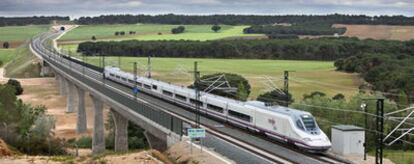What is that train ticket going for?
Renfe is to make the leap into revenue management, adjusting online rates to real-time demand by June of next year. The question is whether it is up to the task
If you get on an airplane and ask each of the passengers how much they paid for their seat, there will be dozens of different answers. Some will make you feel like an astute buyer, others like the world's worst bargain hunter.
Airlines are experts at what is known as revenue management - the simple yet complex method of trying to get a plane filled up in the most profitable manner possible. Now, Spanish railway operator Renfe is planning to implement the same price-on-demand system by June 2012 in some of its AVE and Alvia high-speed trains.
How much would a trip between Barcelona and Madrid cost with this new system? That depends on what you and the other would-be passengers on that particular train are willing to pay.
Train travelers will be able to wait for the right moment before hitting 'buy'
Rates for high-speed trains will depend on real-time demand
Thursday, June 2, at 9.30am. A round-trip Madrid-Barcelona ticket, bought over the telephone a few minutes before departure time, costs 189.60 euro. The train is nearly full. How much would a person have been willing to pay for a seat if a job opportunity depended on it? Or if they had to go to a funeral? Perhaps twice or three times the regular fare.
In Zaragoza, there were a few empty seats. These bring in nothing to Renfe. If they had sold them at half price at the last minute, they might have filled up.
Revenue management and yield management are very similar and complementary concepts based on setting rates according to real-time demand, segmenting clients by class and schedule and trying to get each segment to pay top rate according to its capacity.
This model is pervasive in the airline and hotel industries, but it can also create a lack of trust among customers. This is exactly what happened in Germany. In the case of railways, there is an added element of mistrust due to the lack of competition.
"These variable price systems are being applied in nearly all services. The airlines started it, but today there are even restaurant chains that use it.
"For instance, if they see that there was low demand last year on Sunday nights in a certain month, this year they will introduce a 2x1 offer, which they will extend even further if they see that it works," explains Antonio López de Ávila, of the IE Business School.
What's strange, he says, is that Renfe did not do this before, although this is probably because it has no direct competitors.
The greatest risk for companies using this system is communicating it poorly, explains Philip Daus, director of Simon-Kucher & Partners, a consulting firm specializing in price management. Airlines are one of the main targets of consumer complaints, which often deal with deceptive advertising. Television and internet ads often trumpet very low prices that are very hard to find because they apply to a single seat on the entire flight, or because of all the hidden extra costs (including paying with a credit card through their website). "They've also got to be able to explain the system," says Daus. "In Germany, the rail operator Deutsche Bahn tried to switch over to yield management and failed."
This consultant believes that the problem lay in the fact that Germany's railway network is very complex, and this made passengers reluctant to accept such price variations on their tickets. Also, the variations depended on so many variables that people never really understood why they were being charged more or less.
"In Spain, the high-speed rail network is simpler and journeys are generally point-to-point. This will make the system simpler than in Germany," says Daus, whose company developed Germany's current train pricing system, creating discount tickets for frequent travelers.
"Renfe also faces the risk of doing it wrong and sinking its operating account, which is what happened to a lot of hotels that thought revenue management simply meant putting a person in charge of checking the competition's prices and offering their rooms one euro cheaper," says López. As a result, hotels entered a price war that many have yet to recover from.
"It's not just about making more money, but about distributing the clients correctly. This sales system must serve to make money not through selling at higher prices, but through managing to fill up trains."

Tu suscripción se está usando en otro dispositivo
¿Quieres añadir otro usuario a tu suscripción?
Si continúas leyendo en este dispositivo, no se podrá leer en el otro.
FlechaTu suscripción se está usando en otro dispositivo y solo puedes acceder a EL PAÍS desde un dispositivo a la vez.
Si quieres compartir tu cuenta, cambia tu suscripción a la modalidad Premium, así podrás añadir otro usuario. Cada uno accederá con su propia cuenta de email, lo que os permitirá personalizar vuestra experiencia en EL PAÍS.
¿Tienes una suscripción de empresa? Accede aquí para contratar más cuentas.
En el caso de no saber quién está usando tu cuenta, te recomendamos cambiar tu contraseña aquí.
Si decides continuar compartiendo tu cuenta, este mensaje se mostrará en tu dispositivo y en el de la otra persona que está usando tu cuenta de forma indefinida, afectando a tu experiencia de lectura. Puedes consultar aquí los términos y condiciones de la suscripción digital.








































